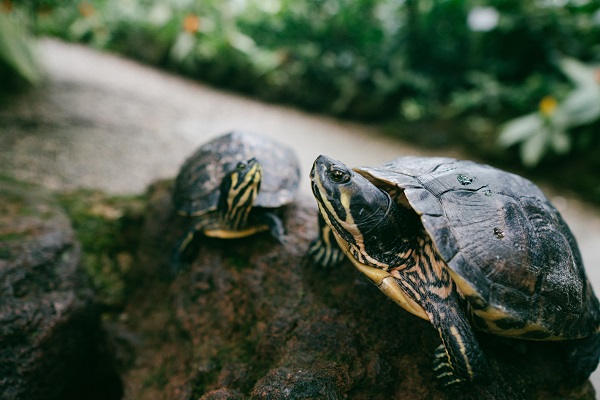Do you have a turtle or are you thinking about getting one? This article contains information on turtle behavior, the many myths about turtles and a lot more.

How to Sex You Turtle
This is difficult to tell in most turtles, until they are older. The males of all turtles will have a longer, thicker tail, with the cloaca located closer to the tip of the tail, whereas females with have a smaller, thinner tail with the vent closer to the main part of the body. In some of the more commonly kept turtles (Sliders, some Maps, Painteds, Cooters), males will also have exceptionally long foreclaws; the females having smaller ones. Males in some species will also display a concave or dented-in plastron. This is to allow the male to better mount the female when mating. Adult females which have laid a clutch of eggs will have a semi-pliable anal section of the plastron. The females, however, in most species of turtles, will be larger, sometimes 4 times larger than the males. And just be on the look-out if you have a male, he might just prove it to you one day. This is called Fanning. This is completely normal, however, sometimes this fanning can lead to health issues especially if tankmates believe it to be something edible and bite it.
The Differences Between Turtles, Tortoises and Terrapins
A turtle is any reptile that lives in a shell. A tortoise is a turtle that lives on the land but can enter the water for a drink, to cool off or to escape and evade predators. A terrapin is a turtle that lives primarily in water, generally leaving only to lay eggs or to bask in the sun.
Do Turtles Bite
Yes. One key thing to keep in mind: If it has a mouth, it can bite. If you would like to feed your turtle by hand, do so with tongs, as some turtles may not have as good of aim as you hope they do.
Are Turtles Mean
Turtles, for the most part, are not aggressive to people. Most turtles are like people or any other pet you have. They have their own personalities and temperaments. Some are aggressive if you pull them out of the water, yet docile in the water and do not attempt to bite. Some of the others are quite different. They will try to run if you remove them from the tank, yet if you place your hand inside the water…well, look out. They think your fingers are chicken tenders! Turtles tend to bite each other accidentally, especially when trying to grab a hold of the same piece of food. Even the supposedly ferocious Alligator Snapping Turtle. The Alligator in the name came from its appearance, not its temperament.
Myths Surrounding Turtles
Myths surround almost everything in the world today and turtles are no different. From the old tales and legends to modern day misconceptions on care and turtles themselves. Hopefully the following list which will continually grow over time will be of some assistance to you.
When a turtle bites you, it won’t let go until it hears thunder. As entertaining as this legend is, it is most definitely false.
Turtles will give you Salmonella. Yes and no. Owning or handling a turtle will not automatically cause you to get sick with salmonella or anything else, just as eating chicken, eggs or pork is a risk for salmonella poisoning every time. People who generally suffer from turtle-contracted salmonella are people who don’t provide proper care for their turtles and have poor personal hygiene practices. After handling turtles or cleaning their habitats, it is always a good idea to wash your hands. You aren’t going to use your hands to clean out your cat’s litter box without washing your hands afterwards, so why would you clean out the turtle’s home (where they eat and use the bathroom) without washing your hands? Additionally, since turtles swim where they eat, drink, and use the bathroom, it stands to reason that you should wash your hands afterwards. Due to their immune systems, it is recommended that turtles and their housing not be handled by youngsters, the elderly or those with compromised immune systems. Keepers all over the world have successfully kept and bred turtles over decades and have never gotten ill.
It is illegal to own a turtle under 4 inches. There are some states where buying a turtle is illegal and others where it is illegal to buy a turtle that is under a shell length of 4 inches, but this involves the buying and selling, not the owning of a turtle. The only time it is illegal to own a turtle or own more than a certain number of a certain species is when it involves a protected species. It is not illegal to own or to buy a turtle under a shell length of 4 inches, again, unless it is a protected species.
Turtle urine causes brain damage in humans when it contacts your skin. While this is medically incorrect, it would make sense in my case and explain an awful lot.
A turtle will only grow to the size of its enclosure. This is false. Turtles will continue to grow, regardless, provided that proper husbandry (feeding, temperatures, habitat, and health) are maintained.
Turtles can leave their shell. The only time a turtle will depart from its shell is when it’s dead. Remember, a turtle’s shell is nothing more than an outwardly visible (and often very attractive), oversized rib cage.
Turtles can eat pizza, chocolate, and hot dogs. Turtles can these things, but just because they can, doesn’t mean they should. I could sit here at my desk, typing this, and eat the computer graphics card that’s sitting on my desk, but it wouldn’t do me any good and could potentially have severe consequences to my health. When people and animals eat things that they shouldn’t, bad things can happen.
Baby turtles need shallow water because they can’t swim well. This is another common misbelief. Baby turtles have the same ability to swim and survive in deeper water. (This is species dependent so make sure you know the proper care instructions for the species of turtle that you own.) Consider that in the wild, if baby turtles were not able to survive in deep water, they would be discovered and eaten by many predators. They, like adults, use deep water for safety. Provided it is a species that accepts deep water, there is no problem with keeping a hatchling adult of those species in a 55- or 75-gallon aquarium, filled to the top. Just ensure they can’t escape.
Turtles that have been kept in shallow water don’t know how to swim and will drown if put in deep water. Turtles are exceptional swimmers by nature, provided it is a species that is indeed aquatic and requires deep water. They don’t undergo swimming lessons and they don’t forget how to swim. It may take a turtle that has been poorly kept in shallow water for 10 years a few hours to get use to the depth, but by no means should a healthy turtle drown or have any problems adjusting.
Related Articles & Free Email Newsletter
10 Reasons to Own a Green Cheeked Conure
How to Identify and Treat Arthritis in a Dog




Comment here